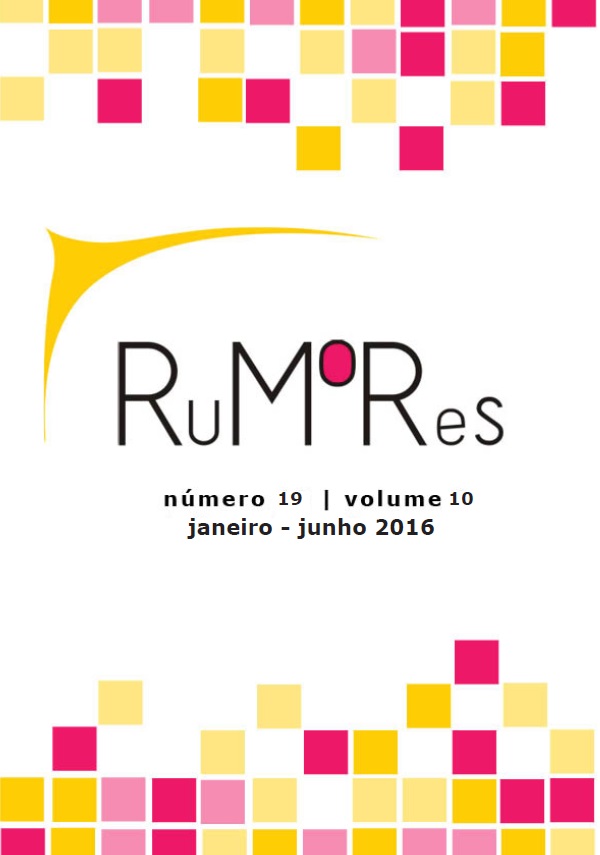“From the kitchen’s door onwards”: gender and social change on the movie The second mother
DOI:
https://doi.org/10.11606/issn.1982-677X.rum.2016.110278Keywords:
Brazilian cinema, family, gender, domestic labour, affective ambiguity.Abstract
The Brazilian movie The second mother (2015), by Anna Muylaert, portrays the disturbance of everyday order to an elite family of São Paulo when the daughter of her maid arrives at their home. This paper examines the ways in which the film articulates intimate, personal and emotional experiences of men and women in Brazil today, marked by the social changes of the last ten years. The article quests key concepts of anthropological studies about housework and some historical aspects of the constitution of the Brazilian family. The melodramatic language and the hint of a happy ending support a benevolent look to recent social transformation. The conclusions suggest that the empowerment of Brazilian women, celebrated by film, must be viewed with caution, since, despite the reduction of the economic gaps, still remain in the country entrenched social inequalities.
Downloads
References
ABU-LUGHOD, Lila. Melodrama egípcio: uma tecnologia do sujeito moderno? Cadernos Pagu, n.21, p. 75-102, 2003.
BRITES, Jurema. Afeto e desigualdade: gênero, geração e classe entre empregadas domésticas e seus empregadores. In: Cadernos Pagu, n.29, p.91-109, jul.-dez. 2007.
COELHO, Maria Claudia. Sobre agradecimentos e desagrados: trocas materiais, relações hierárquicas e sentimentos. In: VELHO, Gilberto; KUSCHNIR, Karina (orgs.). Mediação, Cultura e Política. Rio de Janeiro: Aeroplano, 2001. p.267-291.
COLEN, Shellee. Like a mother to them: stratified reproduction and West Indian Childcare workers and employers in New York. In: GINSBURG, F. e RAPP, R. Conceiving the new world order: the global politics at reproduction. Berkley: University California Press, 1995. p.78-102.
FAGUNDEZ, Ingrid. Não aprendi muito com 'Que Horas Ela Volta?', diz representante de patrões. São Paulo, Folha de S. Paulo, 04 out. 2015. Disponível em: http://www1.folha.uol.com.br/saopaulo/2015/10/1689476-nao-aprendi-muito-com-que-horas-ela-volta-diz-representante-de-patroes.shtml. Acesso em 25 jan. 2016.
FONSECA, Claudia. Apresentação: de família, reprodução e parentesco: algumas considerações. Cadernos Pagu, n.29, p. 9-35, 2007.
FREYRE, Gilberto. Sobrados e mucambos: decadência do patriarcado rural e desenvolvimento do urbano. São Paulo: Global, 2012.
GOLDSTEIN, Donna. The Aesthtics of Domination: Class, Culture, and the Lives of Domestic Workers. In: Laughter out of place: race, class and sexuality in a Rio Shanytown. Berkeley: University of California Press, 2003. p.58-101.
HAHNER, June. Mulheres da elite: honra e distinção das famílias. In: PINSKY, Carla; PEDRO, Joana Maria (orgs.). Nova História das Mulheres no Brasil. São Paulo: Editora Contexto, 2013. p.43-64.
HOCHSCHILD, Arlie. The Managed Heart: commercialization of human feeling. Berkeley; Los Angeles: University of California Press, 2003.
MCROBBIE, Angela. The aftermath of feminism: gender, culture and social change. London: Sage, 2009.
MELLO, Xênia. Eu fui a filha da doméstica que entrou na Universidade. Blogueiras Feministas, 09 set. 2015. Disponível em: http://blogueirasfeministas.com/2015/09/eu-fui-a-filha-da-domestica-que-entrou-na-universidade/. Acesso em 28 out. 2015.
ROLLINS, Judith. Entre Femmes: les domestique et leur patronnes. Actes de la Recherche, no 84, p.63-77, 1990.
SOARES, Luiz Eduardo. A Duplicidade da Cultura Brasileira. In: SOUZA, Jessé (org.). O Malandro e o Protestante: a tese weberiana e a singularidade cultural brasileira. Brasília: Editora Unb, 1999. p. 223-235.
SOUZA, Jessé. Gilberto Freyre e a singularidade cultural brasileira. In: Tempo Social, Revista Sociologia da USP. São Paulo, n.12, vol. 1, p. 69-100, mai. 2000.
VELHO, Gilberto. O patrão e as empregadas domésticas. In: Sociologia, Problemas e Práticas, n. 69, p. 13-30, 2012.
Downloads
Published
Issue
Section
License
Declaro a total e irrestrita cessão de direitos autorais sobre o texto enviado para publicação na Rumores – Revista Online de Comunicação, Linguagem e Mídias. Entendo que o conteúdo do artigo é de minha inteira responsabilidade, inclusive cabendo a mim a apresentação de permissão para uso de imagens, ilustrações, tabelas, gráficos de terceiros que, porventura, venham a integrá-lo.









